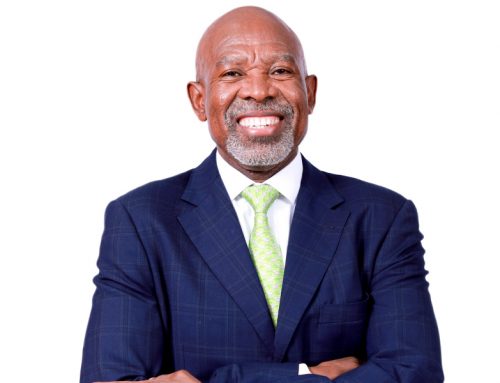Heather Dugmore speaks to Wits alumnus Koos Bekker about communication, China and transition.
 Markets ebb and flow, but one constant that Naspers Chair Koos Bekker understands is that people need to connect with one another and the world.
Markets ebb and flow, but one constant that Naspers Chair Koos Bekker understands is that people need to connect with one another and the world.
“Communication technology has transformed the globe in two short decades,” he says.
“For example: of the businesses that Naspers currently operates in 130 countries, about 98% by value did not exist when I graduated with an LLB from Wits in 1978. In the 1980s came pay TV, in the 90s cell phones. The internet was invented when I was in my forties, and today it’s our main business. These days one has to learn on the hoof and the pace of innovation is quickening, not slowing.”
Uncanny ability to anticipate the future
With an uncanny ability to anticipate the future and adapt, he headed for China in 1997 to invest in communication technology long before China became a business destination.
Four years later, Naspers hit the jackpot when it invested US$32-million in a Chinese internet company called Tencent. Its stake has soared to US$-66 billion today, the most valuable investment Naspers ever made.
Despite this, Bekker is not especially concerned about China’s current economic slowdown. “This year China is growing at a slower pace than its own average for the past three decades, but that’s still faster than the United States or Europe,” he explains.
Chinese slowdown
“The slow down does not really affect us because it hit construction and manufacturing hardest, while Tencent provides consumer services, focusing on instant messaging, online games (such as League of Legends), video and entertainment portals, which continue to grow.”
Tencent now generates the fourth largest revenue stream of internet companies worldwide.
“A growing field for us is e-commerce, where Tencent invested in services like JD (which resembles Amazon), taxi-hailing apps (like Uber), and offline-to-online commerce services.”
What people outside of China often miss, he adds, is that it is no come-lately. China was the biggest economy for most of the past 2 000 years. Only from the 18th century to the end of the 20th century did it lose that position. Recognising that China was likely to resume its pre-eminence, Bekker took the decision to invest in ICT businesses there 17 years ago.
Sitting in the bath
“It’s a long-term commitment. When markets struggle, it’s worth reminding oneself while sitting in the bath that it does not matter at all what the share price is doing tomorrow, but it does matter a great deal what it’s doing five years hence.”
At the age of 62 Koos has plenty of bathtubs from which to gain perspective. He has homes in a number of countries and is constantly travelling the world, mobile office in hand.
His physical office at Naspers’ headquarters in Cape Town is on the 17th floor of a landmark overlooking the harbour, but the internet and e-commerce world has no fixed geographical space; the office is everywhere.
Not afraid of risk or failure
He is constantly on the look out for new opportunities and he is not afraid of risk or failure. “Failure is often useful. After all, when you succeed all you learn is how smart you are,” he explains.
“When you fail, you might possibly learn to improve yourself. Before Tencent, for example, our first three investments in China were flops, then the internet bubble burst in 2000 and the market collapsed. We lost all our money, which is remarkably easy in the fast-moving internet space. After all, some 90% of start-ups in this sector fail within 18 months. But then we fixed our defects and the next round worked out.”
In Bekker’s world “a gun to the head concentrates the mind admirably”.
Heavily invested in e-commerce
Naspers today is heavily invested in e-commerce, especially in classifieds, where it is one of three world leaders. “But investing in this sector requires patience,” he adds. “It’s no get-rich quick business.”
What certainly helps, is that his wits are attuned to punting futuristically, as indicated by his Forbes listing amongst Africa’s richest.
He has as a string of lucrative startup communication technology investments to his name, including M-Net, MultiChoice and being a founder of mobile technology giant MTN. Both Naspers and Bekker made substantial profits from this.
“I’ve been fortunate, but in business your fortune can change in five minutes. Only quick adapters will survive long-term, which is why Naspers will continue to invest in emerging markets, try new technologies and seek out young entrepreneurs with ambitions whom we can back.”
Communication is changing the face of universities
“I love universities and being around young people, which is why I lectured at a few places from Ulaanbaatar in Mongolia to Maastricht to Nanjing.
“It’s remarkable how Asian students are more ambitious than Western ones – in China students will mob you after the lecture, each punting their business concept. European students in general have a less burning drive to succeed and some start talking about the weekend on Wednesday.
The future is in transition
“As for the future of universities worldwide, it’s in transition. In the past one went to university for three to seven years, loaded up on knowledge that you then dispensed in the world outside for the rest of your life. That model is now breaking down in a world where fast innovation compels us to retrain ourselves every few years.
“The present-day university emerged out of the monasteries of the Middle Ages and retains many of the old titles and habits. This conservative foundation is not well suited to the new pace of innovation.
“Many universities seem perplexed how to respond. Some, like MIT in the United States, go online in hearty fashion, hoping to build out a global brand and one day to figure out how to earn income from this model. On the other hand institutes like Oxford do the opposite: avoid online and emphasise the unique benefits of their traditional face-to-face tutorial system.
Restructure to compete
“The jury is out, but I suspect lots of universities will go under rather than make the transition. Perhaps some will succeed with more short courses to retrain adults for new skills, but overall, universities will need to offer more blended learning and online options to meet the growing demand for higher education, and to be able to offer access to students wherever they are situated. Geography will no longer provide protection to universities as higher education options become increasingly available online.”
My LLB at Wits
“After a BA Law and an Honours in Literature at Stellenbosch University, I joined Wits in 1976 for an LLB. I sought a contrast to Stellenbosch, where I was editor of the student newspaper, which was then at odds with the National Party youth wing on the right.
“Wits offered a progressive metropolitan experience in a vibrant city during the politically turbulent 1970s. I loved the diversity of views.
“Wits had much less of a “res” character than Stellenbosch. Unlike the latter or Cambridge or Yale, Wits does not dominate a town. It’s more like Columbia University in New York, where I studied later: a university at the heart of a metropolitan jungle, breathing and heaving with the city sounds all around.
“While at Wits, I studied by day and translated TV dramas at night. That was the start of a journey that later took me to the US and eventually to the launch of M-Net in 1986.
“Curiously, one often makes your lifelong friends at university. I guess you’re too immature still at school, too rigid or preoccupied with the rat race later. University seems to be the ideal moment to link to lifelong friends.”
At a glance Q&A with Koos Bekker
How do you keep balanced?
I’m quite poor at balance – I find work a lot more entertaining than social chitchat.
What does money mean to you?
A little bit of money buys freedom. But not that much is needed to live well.
In what way do you think you are useful to society?
Our group created tens of thousands of jobs in the new South Africa. We also innovated with technologies like the decoder, of which R6 billion worth have been exported. We create pay TV and helped launch cellular telephony here. Now we’re crafting a range of internet services, including News24, Kalahari and OLX.
What do you think about South Africa today?
Under Madiba the post-1994 South Africa started building some sense of common destiny. That seems to be unraveling. We haven’t yet achieved a ‘we’ society – where all feel valued and included. Clearly, we need to evolve a society where people are not classified by race. A good public school system is the most efficient equaliser. But our worst performance as a country is a dysfunctional school system. So there’s work to do.
What do you think about South Africa’s economy?
South Africa has grown at a real average of 3.1% since 1994, which is better than the Eurozone or the US. Looked at differently: about half the wealth in South Africa today (thus all the shares, property, cash) was created since 1994, post-apartheid. These are big achievements. However, most recently, our economic trends turned sharply negative. We have enterprising people and one of the most beautiful countries in the world, so if we address this trend with a sense of urgency and manage our economy well, there is no reason why we cannot prosper.
Should Mandarin be taught at schools in South Africa?
Yes, without a doubt. Naspers helped establish the first department of mandarin at a South African university, today the Confucius Institute at Stellenbosch. Any local child who manages to master mandarin has acquired a useful skill. Learning the language not only helps us communicate with people in one of the top two economies globally, it also teaches us quite a bit about Chinese culture, including dinner etiquette, history and the way to do business: it’s an exciting, fascinating culture.
How is business done in China?
By comparison, in the US one can easily conclude a major long-term contract without ever eating with your counterpart. Good luck if you try this in China: there, you first have to establish trust. This is best done by spending time together and sharing a meal where famous Chinese dishes are served.
What’s your favourite Chinese dish?
Up North: Beijing kaoya (Peking duck). I’m also partial to the clean steamed fish dishes of Guangdong in the South and the spicy stuff from Sichuan in the West. I must add that Chinese red wines have markedly improved over the past decade.
What can South Africa learn from China?
One of the interesting features there is that civil servants are often highly qualified and most efficient. They make it clear that foreign investment in China is welcome and they are very helpful to new investors.




